Volkswagen: Culture, Performance Decline, and Transformation Report
VerifiedAdded on 2022/09/09
|10
|2165
|15
Report
AI Summary
This report examines the strategic context of Volkswagen, focusing on its historical approach to gaining a competitive advantage. It analyzes the impact of a negative organizational culture, particularly in relation to the diesel emission scandal, which significantly damaged the company's image and highlighted internal issues. The report further explores Volkswagen's cultural transformation efforts, including the introduction of the Together4Integrity (T4I) program, designed to rebuild trust, improve employee engagement, and promote ethical behavior. It compares Volkswagen's initiatives with those of other companies like BMW, emphasizing the importance of transparency, integrity, and a strong corporate culture in driving long-term success and sustainable mobility. The conclusion highlights the role of corporate culture in influencing Volkswagen's strategic direction and the potential of the T4I program to foster a positive workplace environment.
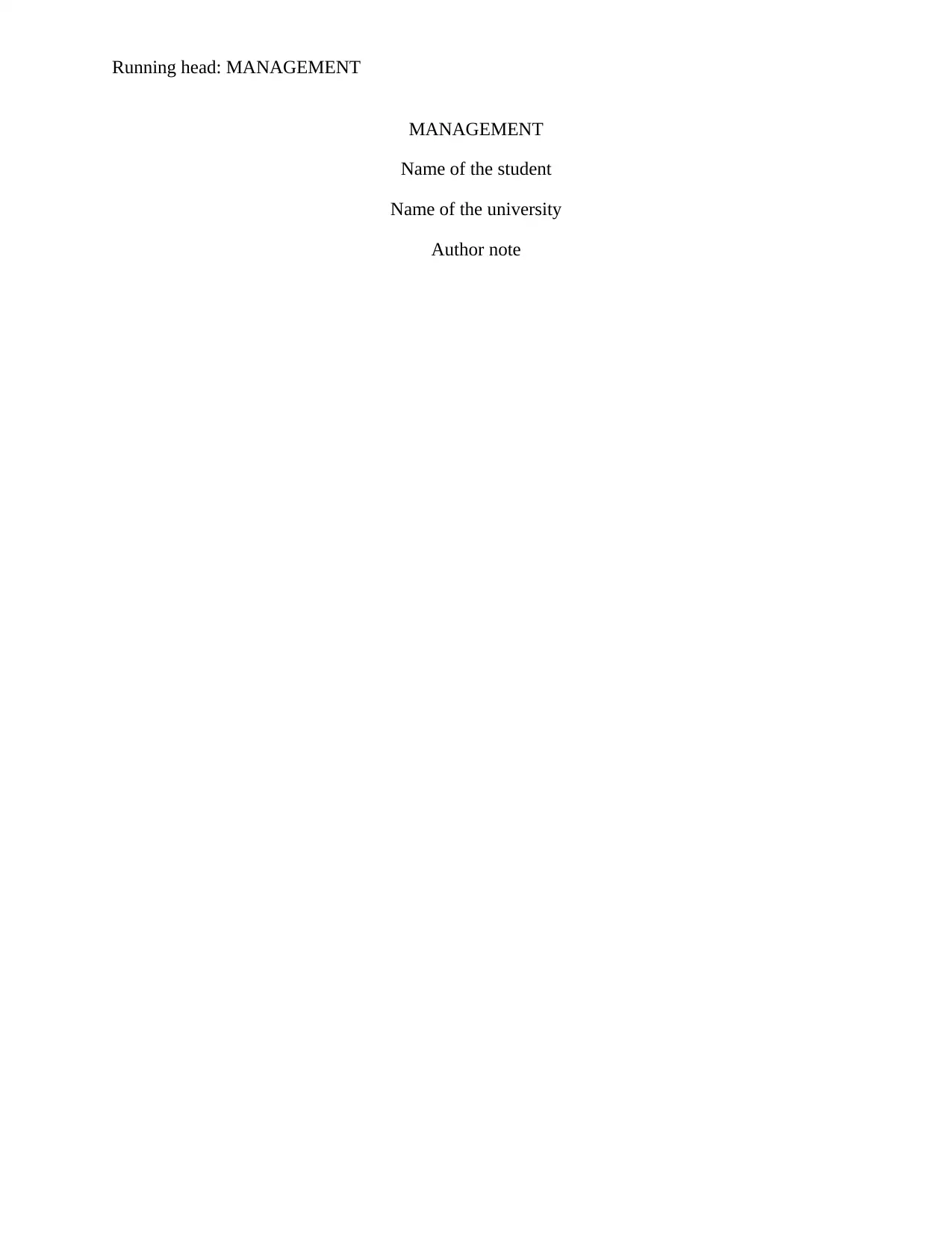
Running head: MANAGEMENT
MANAGEMENT
Name of the student
Name of the university
Author note
MANAGEMENT
Name of the student
Name of the university
Author note
Paraphrase This Document
Need a fresh take? Get an instant paraphrase of this document with our AI Paraphraser
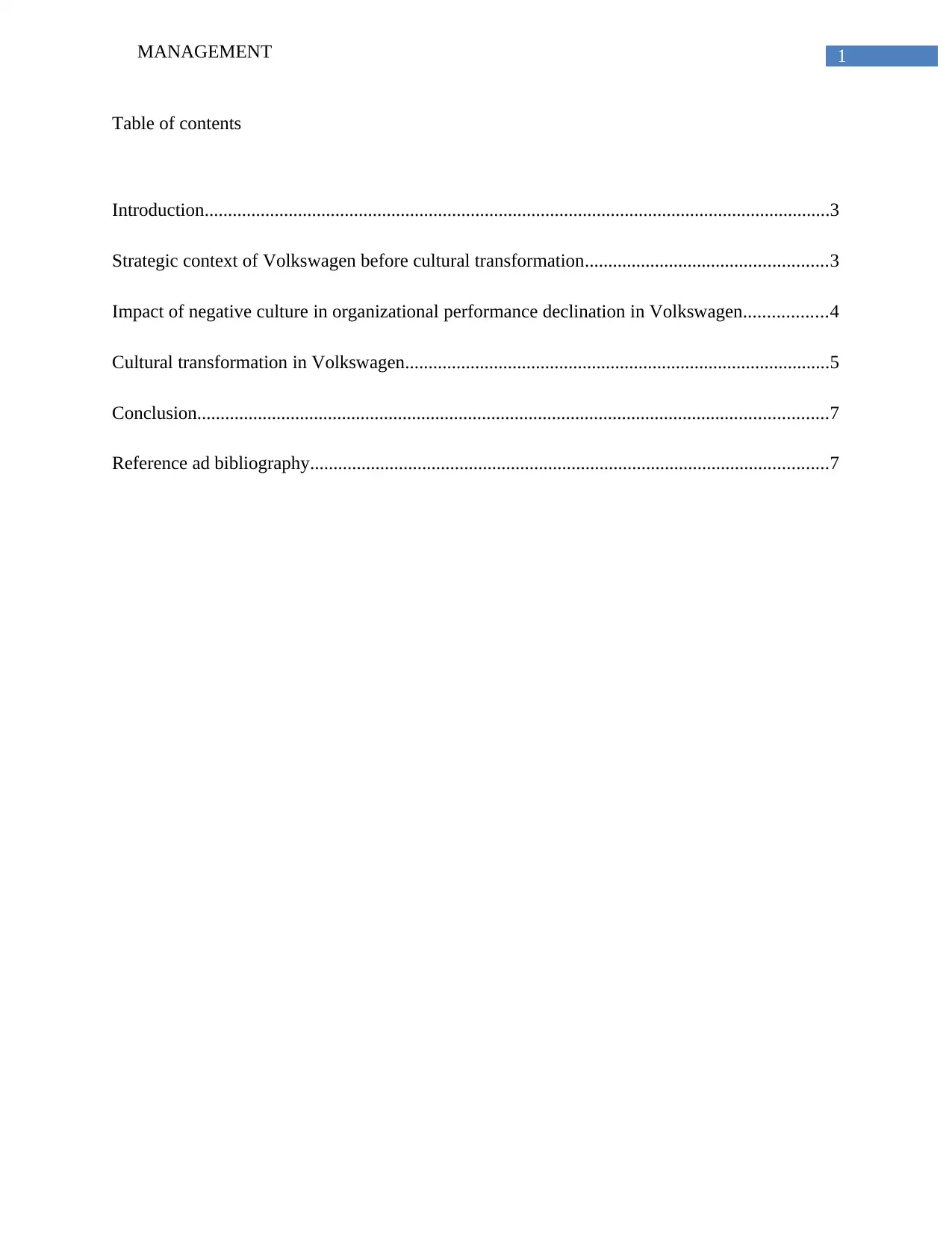
1MANAGEMENT
Table of contents
Introduction......................................................................................................................................3
Strategic context of Volkswagen before cultural transformation....................................................3
Impact of negative culture in organizational performance declination in Volkswagen..................4
Cultural transformation in Volkswagen...........................................................................................5
Conclusion.......................................................................................................................................7
Reference ad bibliography...............................................................................................................7
Table of contents
Introduction......................................................................................................................................3
Strategic context of Volkswagen before cultural transformation....................................................3
Impact of negative culture in organizational performance declination in Volkswagen..................4
Cultural transformation in Volkswagen...........................................................................................5
Conclusion.......................................................................................................................................7
Reference ad bibliography...............................................................................................................7
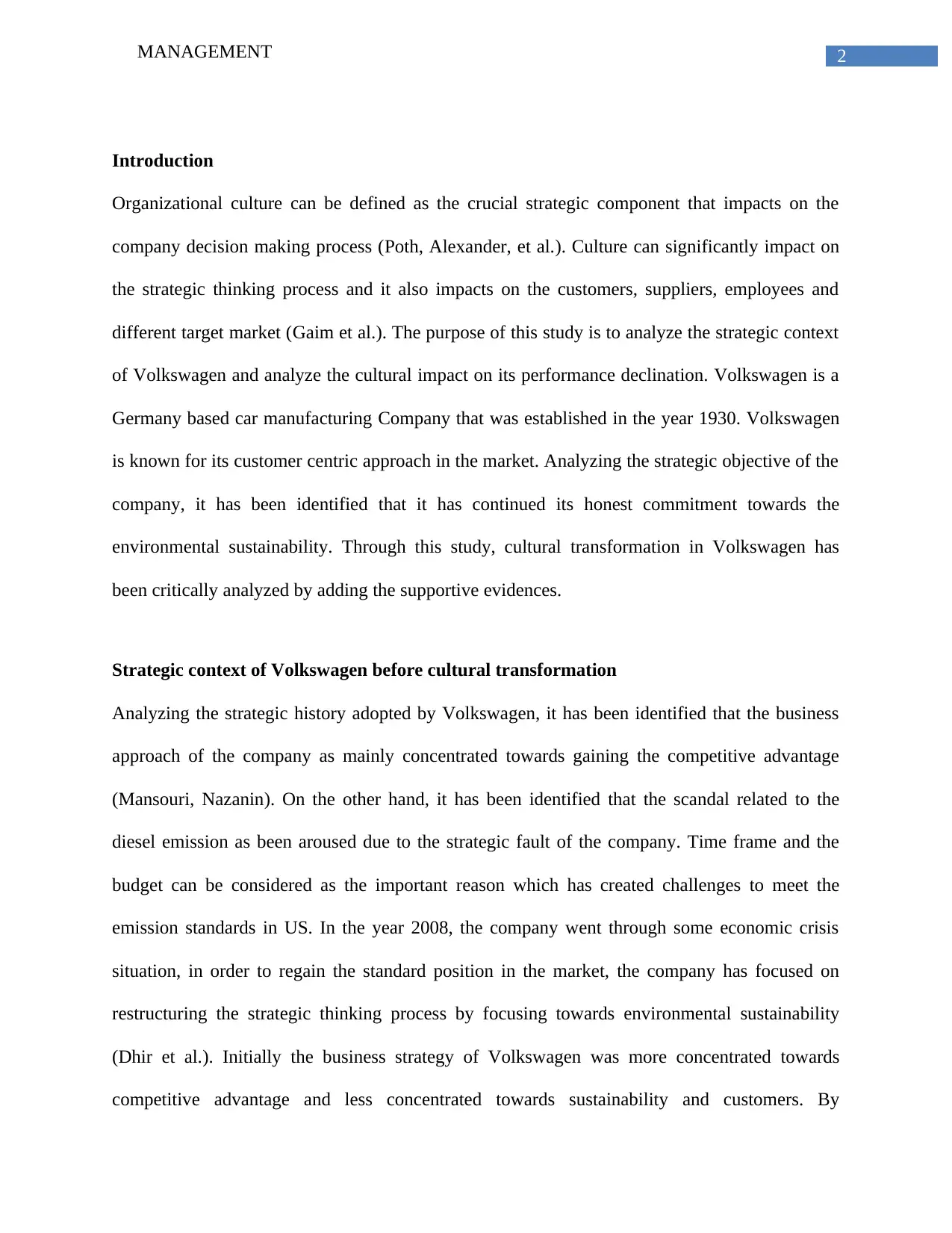
2MANAGEMENT
Introduction
Organizational culture can be defined as the crucial strategic component that impacts on the
company decision making process (Poth, Alexander, et al.). Culture can significantly impact on
the strategic thinking process and it also impacts on the customers, suppliers, employees and
different target market (Gaim et al.). The purpose of this study is to analyze the strategic context
of Volkswagen and analyze the cultural impact on its performance declination. Volkswagen is a
Germany based car manufacturing Company that was established in the year 1930. Volkswagen
is known for its customer centric approach in the market. Analyzing the strategic objective of the
company, it has been identified that it has continued its honest commitment towards the
environmental sustainability. Through this study, cultural transformation in Volkswagen has
been critically analyzed by adding the supportive evidences.
Strategic context of Volkswagen before cultural transformation
Analyzing the strategic history adopted by Volkswagen, it has been identified that the business
approach of the company as mainly concentrated towards gaining the competitive advantage
(Mansouri, Nazanin). On the other hand, it has been identified that the scandal related to the
diesel emission as been aroused due to the strategic fault of the company. Time frame and the
budget can be considered as the important reason which has created challenges to meet the
emission standards in US. In the year 2008, the company went through some economic crisis
situation, in order to regain the standard position in the market, the company has focused on
restructuring the strategic thinking process by focusing towards environmental sustainability
(Dhir et al.). Initially the business strategy of Volkswagen was more concentrated towards
competitive advantage and less concentrated towards sustainability and customers. By
Introduction
Organizational culture can be defined as the crucial strategic component that impacts on the
company decision making process (Poth, Alexander, et al.). Culture can significantly impact on
the strategic thinking process and it also impacts on the customers, suppliers, employees and
different target market (Gaim et al.). The purpose of this study is to analyze the strategic context
of Volkswagen and analyze the cultural impact on its performance declination. Volkswagen is a
Germany based car manufacturing Company that was established in the year 1930. Volkswagen
is known for its customer centric approach in the market. Analyzing the strategic objective of the
company, it has been identified that it has continued its honest commitment towards the
environmental sustainability. Through this study, cultural transformation in Volkswagen has
been critically analyzed by adding the supportive evidences.
Strategic context of Volkswagen before cultural transformation
Analyzing the strategic history adopted by Volkswagen, it has been identified that the business
approach of the company as mainly concentrated towards gaining the competitive advantage
(Mansouri, Nazanin). On the other hand, it has been identified that the scandal related to the
diesel emission as been aroused due to the strategic fault of the company. Time frame and the
budget can be considered as the important reason which has created challenges to meet the
emission standards in US. In the year 2008, the company went through some economic crisis
situation, in order to regain the standard position in the market, the company has focused on
restructuring the strategic thinking process by focusing towards environmental sustainability
(Dhir et al.). Initially the business strategy of Volkswagen was more concentrated towards
competitive advantage and less concentrated towards sustainability and customers. By
⊘ This is a preview!⊘
Do you want full access?
Subscribe today to unlock all pages.

Trusted by 1+ million students worldwide
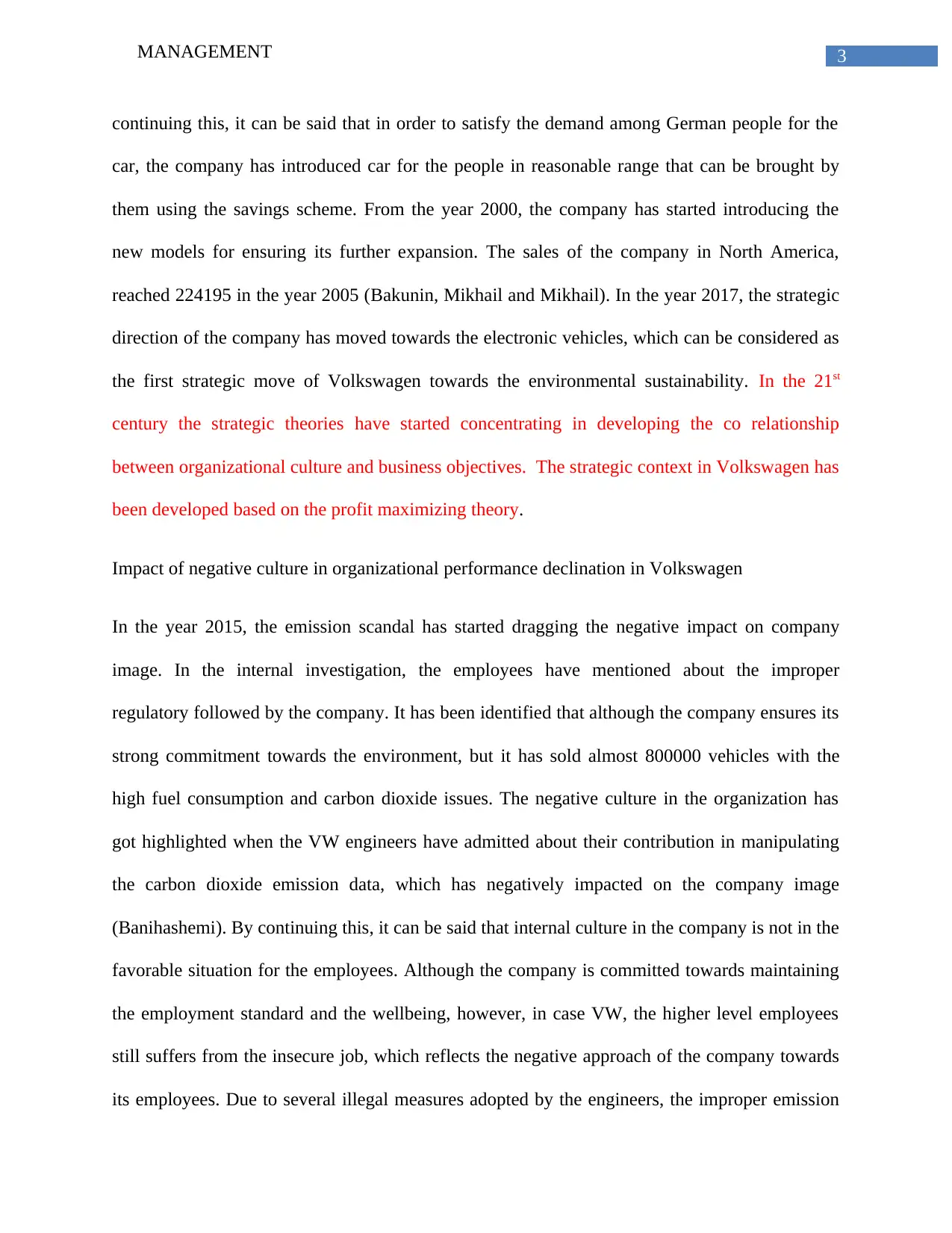
3MANAGEMENT
continuing this, it can be said that in order to satisfy the demand among German people for the
car, the company has introduced car for the people in reasonable range that can be brought by
them using the savings scheme. From the year 2000, the company has started introducing the
new models for ensuring its further expansion. The sales of the company in North America,
reached 224195 in the year 2005 (Bakunin, Mikhail and Mikhail). In the year 2017, the strategic
direction of the company has moved towards the electronic vehicles, which can be considered as
the first strategic move of Volkswagen towards the environmental sustainability. In the 21st
century the strategic theories have started concentrating in developing the co relationship
between organizational culture and business objectives. The strategic context in Volkswagen has
been developed based on the profit maximizing theory.
Impact of negative culture in organizational performance declination in Volkswagen
In the year 2015, the emission scandal has started dragging the negative impact on company
image. In the internal investigation, the employees have mentioned about the improper
regulatory followed by the company. It has been identified that although the company ensures its
strong commitment towards the environment, but it has sold almost 800000 vehicles with the
high fuel consumption and carbon dioxide issues. The negative culture in the organization has
got highlighted when the VW engineers have admitted about their contribution in manipulating
the carbon dioxide emission data, which has negatively impacted on the company image
(Banihashemi). By continuing this, it can be said that internal culture in the company is not in the
favorable situation for the employees. Although the company is committed towards maintaining
the employment standard and the wellbeing, however, in case VW, the higher level employees
still suffers from the insecure job, which reflects the negative approach of the company towards
its employees. Due to several illegal measures adopted by the engineers, the improper emission
continuing this, it can be said that in order to satisfy the demand among German people for the
car, the company has introduced car for the people in reasonable range that can be brought by
them using the savings scheme. From the year 2000, the company has started introducing the
new models for ensuring its further expansion. The sales of the company in North America,
reached 224195 in the year 2005 (Bakunin, Mikhail and Mikhail). In the year 2017, the strategic
direction of the company has moved towards the electronic vehicles, which can be considered as
the first strategic move of Volkswagen towards the environmental sustainability. In the 21st
century the strategic theories have started concentrating in developing the co relationship
between organizational culture and business objectives. The strategic context in Volkswagen has
been developed based on the profit maximizing theory.
Impact of negative culture in organizational performance declination in Volkswagen
In the year 2015, the emission scandal has started dragging the negative impact on company
image. In the internal investigation, the employees have mentioned about the improper
regulatory followed by the company. It has been identified that although the company ensures its
strong commitment towards the environment, but it has sold almost 800000 vehicles with the
high fuel consumption and carbon dioxide issues. The negative culture in the organization has
got highlighted when the VW engineers have admitted about their contribution in manipulating
the carbon dioxide emission data, which has negatively impacted on the company image
(Banihashemi). By continuing this, it can be said that internal culture in the company is not in the
favorable situation for the employees. Although the company is committed towards maintaining
the employment standard and the wellbeing, however, in case VW, the higher level employees
still suffers from the insecure job, which reflects the negative approach of the company towards
its employees. Due to several illegal measures adopted by the engineers, the improper emission
Paraphrase This Document
Need a fresh take? Get an instant paraphrase of this document with our AI Paraphraser
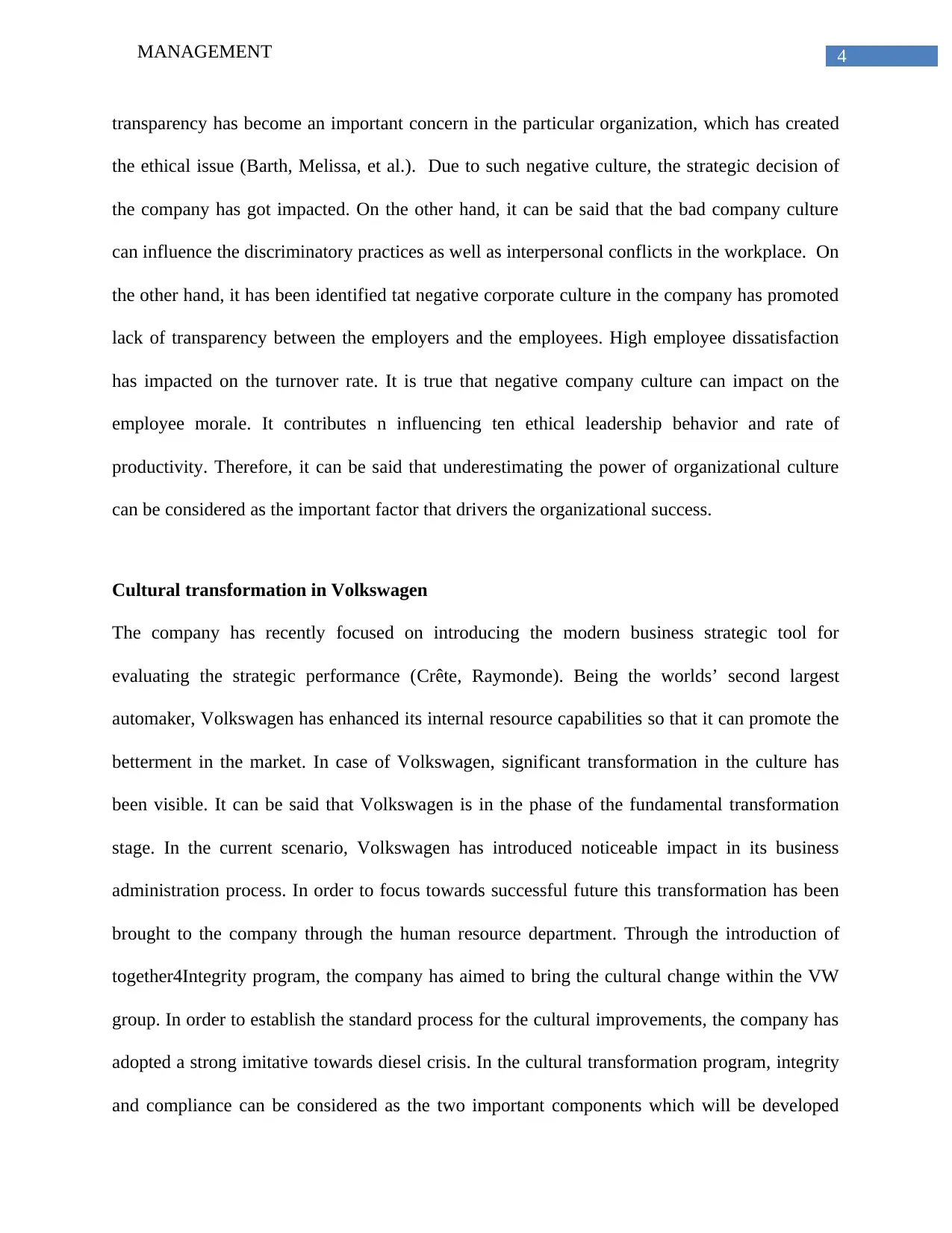
4MANAGEMENT
transparency has become an important concern in the particular organization, which has created
the ethical issue (Barth, Melissa, et al.). Due to such negative culture, the strategic decision of
the company has got impacted. On the other hand, it can be said that the bad company culture
can influence the discriminatory practices as well as interpersonal conflicts in the workplace. On
the other hand, it has been identified tat negative corporate culture in the company has promoted
lack of transparency between the employers and the employees. High employee dissatisfaction
has impacted on the turnover rate. It is true that negative company culture can impact on the
employee morale. It contributes n influencing ten ethical leadership behavior and rate of
productivity. Therefore, it can be said that underestimating the power of organizational culture
can be considered as the important factor that drivers the organizational success.
Cultural transformation in Volkswagen
The company has recently focused on introducing the modern business strategic tool for
evaluating the strategic performance (Crête, Raymonde). Being the worlds’ second largest
automaker, Volkswagen has enhanced its internal resource capabilities so that it can promote the
betterment in the market. In case of Volkswagen, significant transformation in the culture has
been visible. It can be said that Volkswagen is in the phase of the fundamental transformation
stage. In the current scenario, Volkswagen has introduced noticeable impact in its business
administration process. In order to focus towards successful future this transformation has been
brought to the company through the human resource department. Through the introduction of
together4Integrity program, the company has aimed to bring the cultural change within the VW
group. In order to establish the standard process for the cultural improvements, the company has
adopted a strong imitative towards diesel crisis. In the cultural transformation program, integrity
and compliance can be considered as the two important components which will be developed
transparency has become an important concern in the particular organization, which has created
the ethical issue (Barth, Melissa, et al.). Due to such negative culture, the strategic decision of
the company has got impacted. On the other hand, it can be said that the bad company culture
can influence the discriminatory practices as well as interpersonal conflicts in the workplace. On
the other hand, it has been identified tat negative corporate culture in the company has promoted
lack of transparency between the employers and the employees. High employee dissatisfaction
has impacted on the turnover rate. It is true that negative company culture can impact on the
employee morale. It contributes n influencing ten ethical leadership behavior and rate of
productivity. Therefore, it can be said that underestimating the power of organizational culture
can be considered as the important factor that drivers the organizational success.
Cultural transformation in Volkswagen
The company has recently focused on introducing the modern business strategic tool for
evaluating the strategic performance (Crête, Raymonde). Being the worlds’ second largest
automaker, Volkswagen has enhanced its internal resource capabilities so that it can promote the
betterment in the market. In case of Volkswagen, significant transformation in the culture has
been visible. It can be said that Volkswagen is in the phase of the fundamental transformation
stage. In the current scenario, Volkswagen has introduced noticeable impact in its business
administration process. In order to focus towards successful future this transformation has been
brought to the company through the human resource department. Through the introduction of
together4Integrity program, the company has aimed to bring the cultural change within the VW
group. In order to establish the standard process for the cultural improvements, the company has
adopted a strong imitative towards diesel crisis. In the cultural transformation program, integrity
and compliance can be considered as the two important components which will be developed
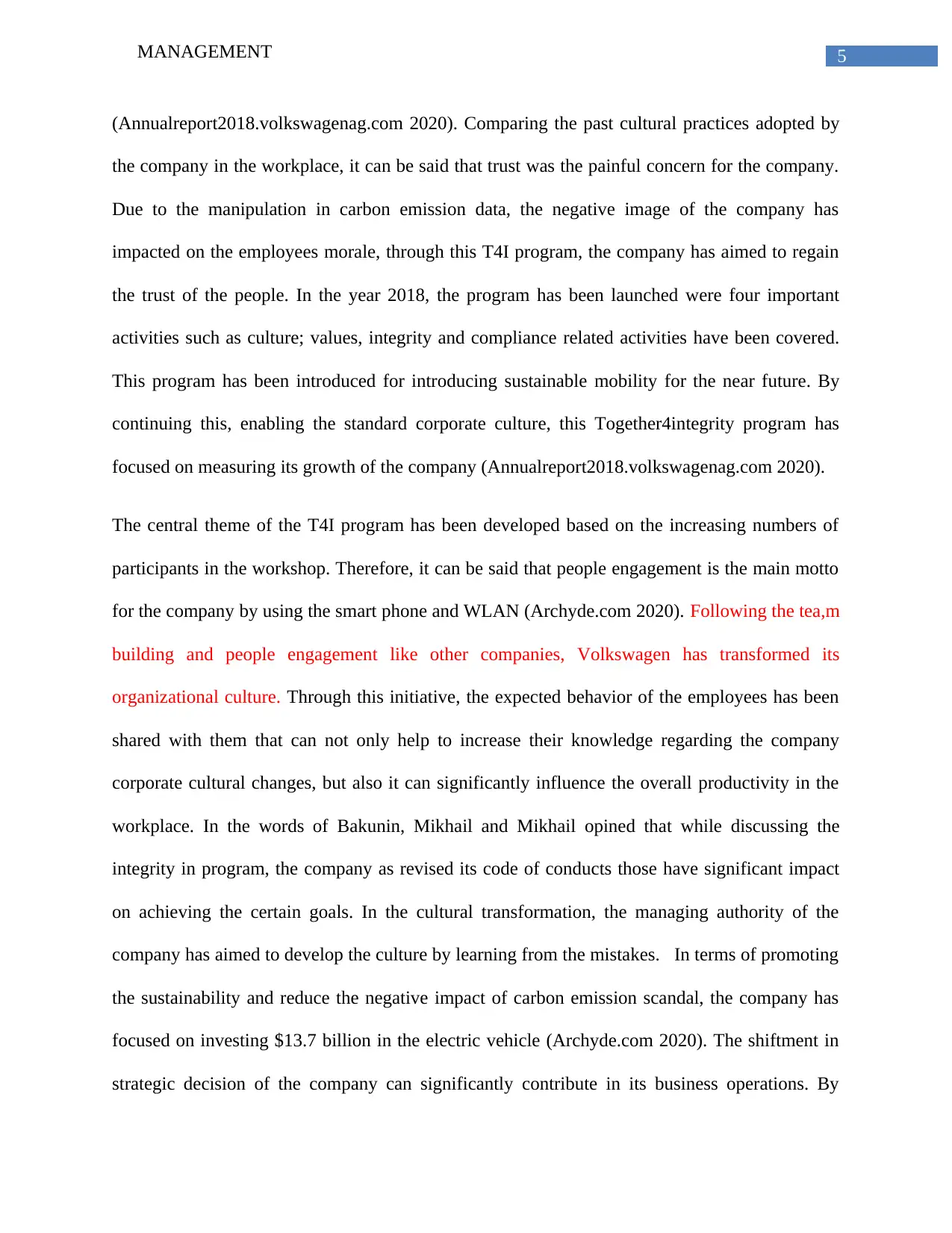
5MANAGEMENT
(Annualreport2018.volkswagenag.com 2020). Comparing the past cultural practices adopted by
the company in the workplace, it can be said that trust was the painful concern for the company.
Due to the manipulation in carbon emission data, the negative image of the company has
impacted on the employees morale, through this T4I program, the company has aimed to regain
the trust of the people. In the year 2018, the program has been launched were four important
activities such as culture; values, integrity and compliance related activities have been covered.
This program has been introduced for introducing sustainable mobility for the near future. By
continuing this, enabling the standard corporate culture, this Together4integrity program has
focused on measuring its growth of the company (Annualreport2018.volkswagenag.com 2020).
The central theme of the T4I program has been developed based on the increasing numbers of
participants in the workshop. Therefore, it can be said that people engagement is the main motto
for the company by using the smart phone and WLAN (Archyde.com 2020). Following the tea,m
building and people engagement like other companies, Volkswagen has transformed its
organizational culture. Through this initiative, the expected behavior of the employees has been
shared with them that can not only help to increase their knowledge regarding the company
corporate cultural changes, but also it can significantly influence the overall productivity in the
workplace. In the words of Bakunin, Mikhail and Mikhail opined that while discussing the
integrity in program, the company as revised its code of conducts those have significant impact
on achieving the certain goals. In the cultural transformation, the managing authority of the
company has aimed to develop the culture by learning from the mistakes. In terms of promoting
the sustainability and reduce the negative impact of carbon emission scandal, the company has
focused on investing $13.7 billion in the electric vehicle (Archyde.com 2020). The shiftment in
strategic decision of the company can significantly contribute in its business operations. By
(Annualreport2018.volkswagenag.com 2020). Comparing the past cultural practices adopted by
the company in the workplace, it can be said that trust was the painful concern for the company.
Due to the manipulation in carbon emission data, the negative image of the company has
impacted on the employees morale, through this T4I program, the company has aimed to regain
the trust of the people. In the year 2018, the program has been launched were four important
activities such as culture; values, integrity and compliance related activities have been covered.
This program has been introduced for introducing sustainable mobility for the near future. By
continuing this, enabling the standard corporate culture, this Together4integrity program has
focused on measuring its growth of the company (Annualreport2018.volkswagenag.com 2020).
The central theme of the T4I program has been developed based on the increasing numbers of
participants in the workshop. Therefore, it can be said that people engagement is the main motto
for the company by using the smart phone and WLAN (Archyde.com 2020). Following the tea,m
building and people engagement like other companies, Volkswagen has transformed its
organizational culture. Through this initiative, the expected behavior of the employees has been
shared with them that can not only help to increase their knowledge regarding the company
corporate cultural changes, but also it can significantly influence the overall productivity in the
workplace. In the words of Bakunin, Mikhail and Mikhail opined that while discussing the
integrity in program, the company as revised its code of conducts those have significant impact
on achieving the certain goals. In the cultural transformation, the managing authority of the
company has aimed to develop the culture by learning from the mistakes. In terms of promoting
the sustainability and reduce the negative impact of carbon emission scandal, the company has
focused on investing $13.7 billion in the electric vehicle (Archyde.com 2020). The shiftment in
strategic decision of the company can significantly contribute in its business operations. By
⊘ This is a preview!⊘
Do you want full access?
Subscribe today to unlock all pages.

Trusted by 1+ million students worldwide
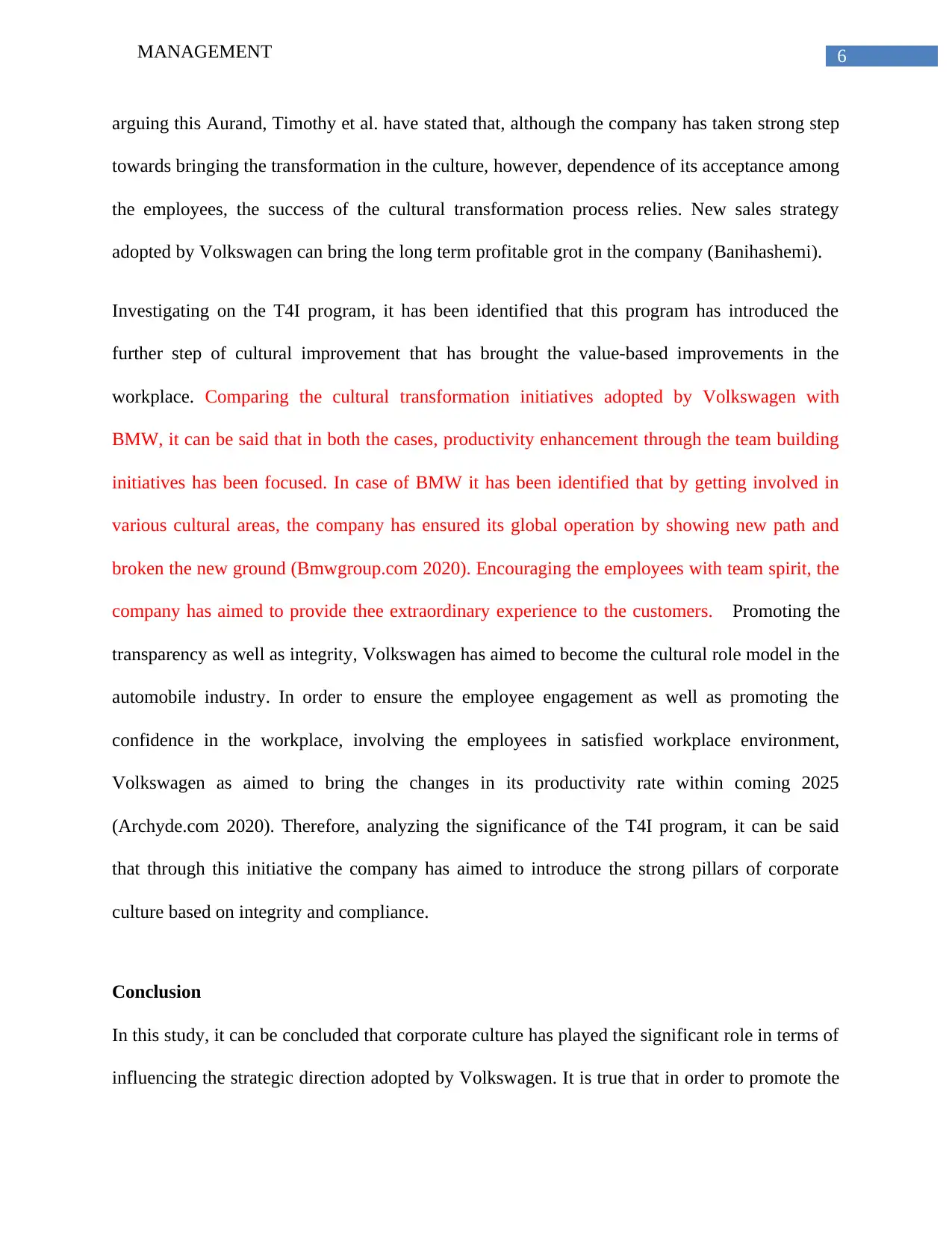
6MANAGEMENT
arguing this Aurand, Timothy et al. have stated that, although the company has taken strong step
towards bringing the transformation in the culture, however, dependence of its acceptance among
the employees, the success of the cultural transformation process relies. New sales strategy
adopted by Volkswagen can bring the long term profitable grot in the company (Banihashemi).
Investigating on the T4I program, it has been identified that this program has introduced the
further step of cultural improvement that has brought the value-based improvements in the
workplace. Comparing the cultural transformation initiatives adopted by Volkswagen with
BMW, it can be said that in both the cases, productivity enhancement through the team building
initiatives has been focused. In case of BMW it has been identified that by getting involved in
various cultural areas, the company has ensured its global operation by showing new path and
broken the new ground (Bmwgroup.com 2020). Encouraging the employees with team spirit, the
company has aimed to provide thee extraordinary experience to the customers. Promoting the
transparency as well as integrity, Volkswagen has aimed to become the cultural role model in the
automobile industry. In order to ensure the employee engagement as well as promoting the
confidence in the workplace, involving the employees in satisfied workplace environment,
Volkswagen as aimed to bring the changes in its productivity rate within coming 2025
(Archyde.com 2020). Therefore, analyzing the significance of the T4I program, it can be said
that through this initiative the company has aimed to introduce the strong pillars of corporate
culture based on integrity and compliance.
Conclusion
In this study, it can be concluded that corporate culture has played the significant role in terms of
influencing the strategic direction adopted by Volkswagen. It is true that in order to promote the
arguing this Aurand, Timothy et al. have stated that, although the company has taken strong step
towards bringing the transformation in the culture, however, dependence of its acceptance among
the employees, the success of the cultural transformation process relies. New sales strategy
adopted by Volkswagen can bring the long term profitable grot in the company (Banihashemi).
Investigating on the T4I program, it has been identified that this program has introduced the
further step of cultural improvement that has brought the value-based improvements in the
workplace. Comparing the cultural transformation initiatives adopted by Volkswagen with
BMW, it can be said that in both the cases, productivity enhancement through the team building
initiatives has been focused. In case of BMW it has been identified that by getting involved in
various cultural areas, the company has ensured its global operation by showing new path and
broken the new ground (Bmwgroup.com 2020). Encouraging the employees with team spirit, the
company has aimed to provide thee extraordinary experience to the customers. Promoting the
transparency as well as integrity, Volkswagen has aimed to become the cultural role model in the
automobile industry. In order to ensure the employee engagement as well as promoting the
confidence in the workplace, involving the employees in satisfied workplace environment,
Volkswagen as aimed to bring the changes in its productivity rate within coming 2025
(Archyde.com 2020). Therefore, analyzing the significance of the T4I program, it can be said
that through this initiative the company has aimed to introduce the strong pillars of corporate
culture based on integrity and compliance.
Conclusion
In this study, it can be concluded that corporate culture has played the significant role in terms of
influencing the strategic direction adopted by Volkswagen. It is true that in order to promote the
Paraphrase This Document
Need a fresh take? Get an instant paraphrase of this document with our AI Paraphraser
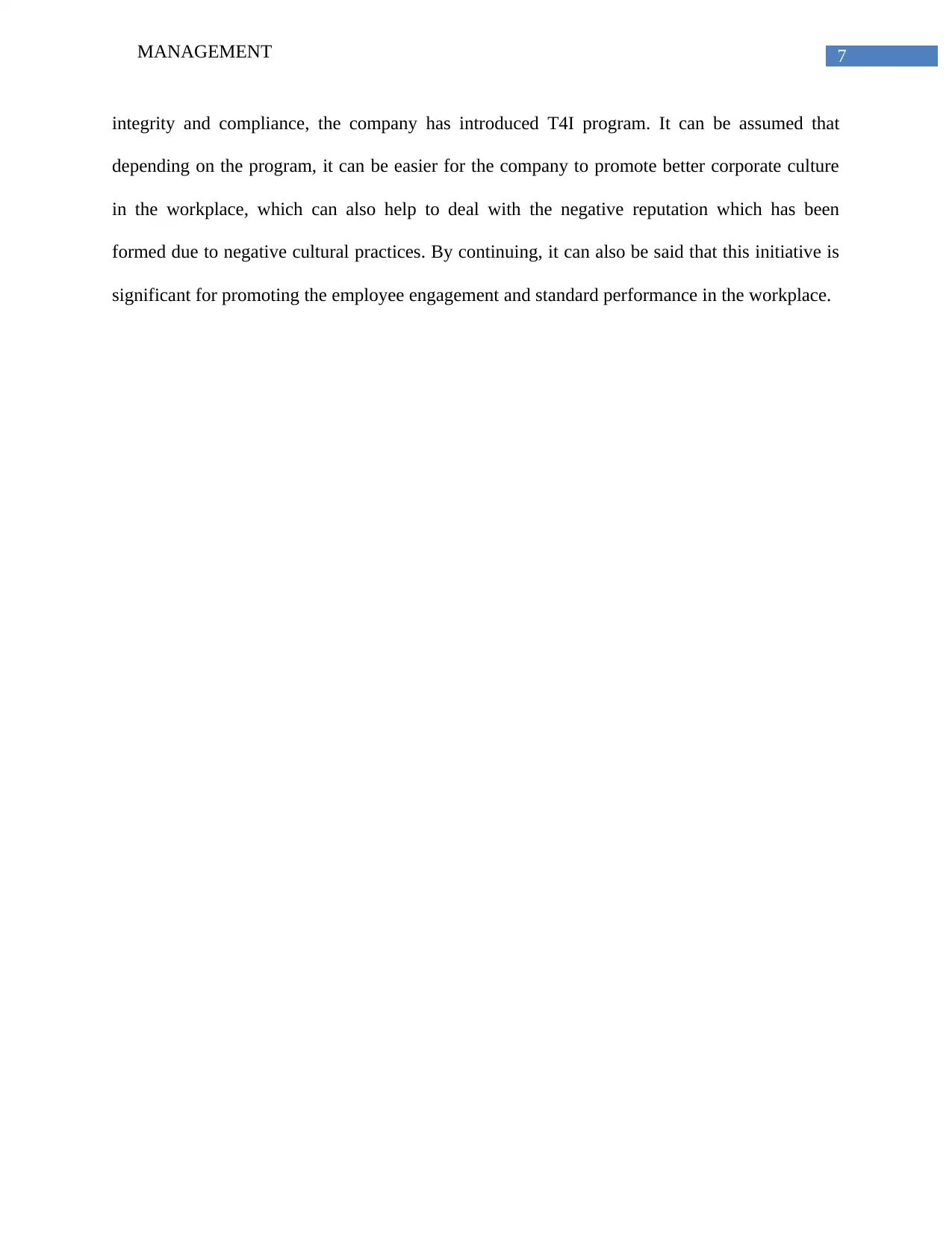
7MANAGEMENT
integrity and compliance, the company has introduced T4I program. It can be assumed that
depending on the program, it can be easier for the company to promote better corporate culture
in the workplace, which can also help to deal with the negative reputation which has been
formed due to negative cultural practices. By continuing, it can also be said that this initiative is
significant for promoting the employee engagement and standard performance in the workplace.
integrity and compliance, the company has introduced T4I program. It can be assumed that
depending on the program, it can be easier for the company to promote better corporate culture
in the workplace, which can also help to deal with the negative reputation which has been
formed due to negative cultural practices. By continuing, it can also be said that this initiative is
significant for promoting the employee engagement and standard performance in the workplace.
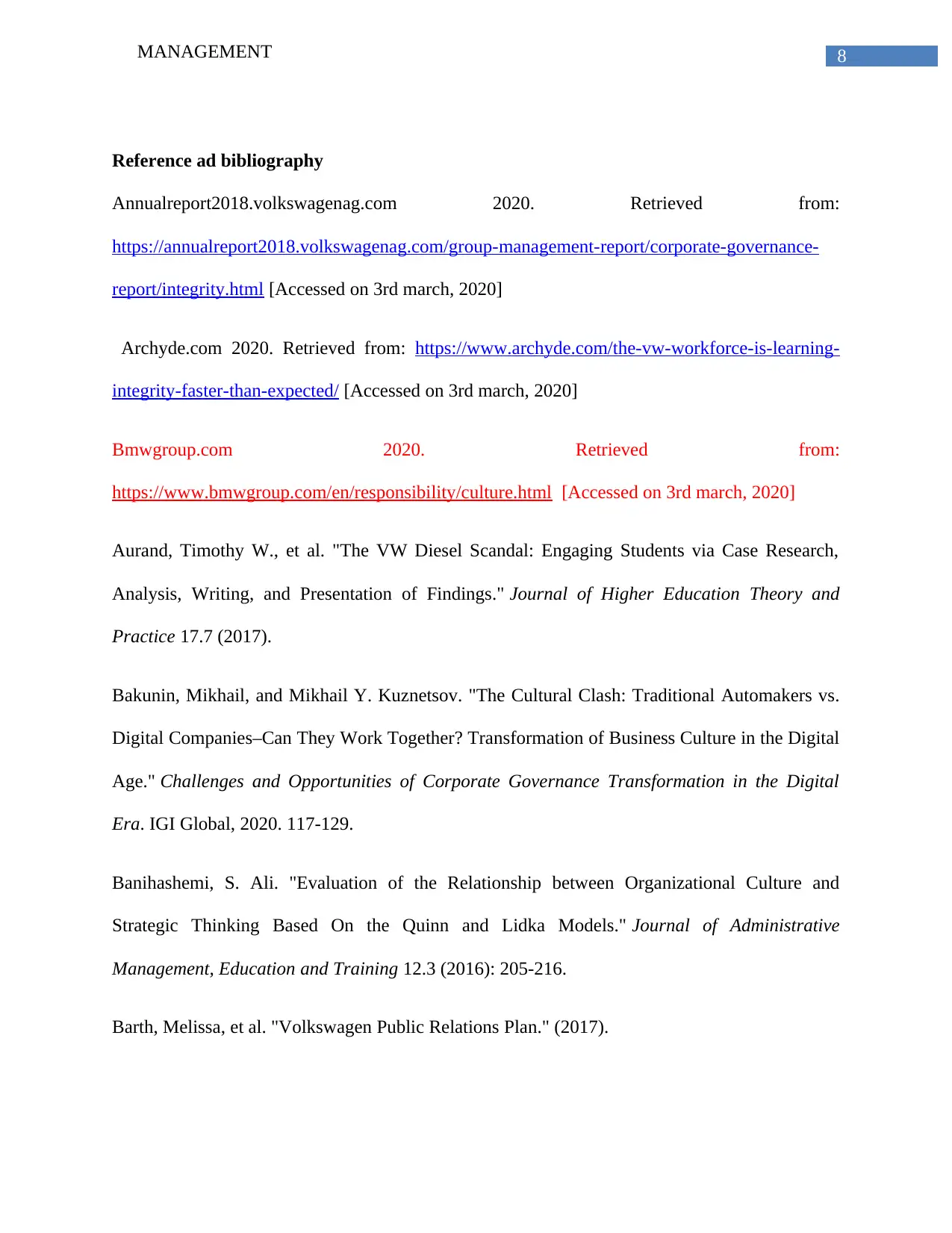
8MANAGEMENT
Reference ad bibliography
Annualreport2018.volkswagenag.com 2020. Retrieved from:
https://annualreport2018.volkswagenag.com/group-management-report/corporate-governance-
report/integrity.html [Accessed on 3rd march, 2020]
Archyde.com 2020. Retrieved from: https://www.archyde.com/the-vw-workforce-is-learning-
integrity-faster-than-expected/ [Accessed on 3rd march, 2020]
Bmwgroup.com 2020. Retrieved from:
https://www.bmwgroup.com/en/responsibility/culture.html [Accessed on 3rd march, 2020]
Aurand, Timothy W., et al. "The VW Diesel Scandal: Engaging Students via Case Research,
Analysis, Writing, and Presentation of Findings." Journal of Higher Education Theory and
Practice 17.7 (2017).
Bakunin, Mikhail, and Mikhail Y. Kuznetsov. "The Cultural Clash: Traditional Automakers vs.
Digital Companies–Can They Work Together? Transformation of Business Culture in the Digital
Age." Challenges and Opportunities of Corporate Governance Transformation in the Digital
Era. IGI Global, 2020. 117-129.
Banihashemi, S. Ali. "Evaluation of the Relationship between Organizational Culture and
Strategic Thinking Based On the Quinn and Lidka Models." Journal of Administrative
Management, Education and Training 12.3 (2016): 205-216.
Barth, Melissa, et al. "Volkswagen Public Relations Plan." (2017).
Reference ad bibliography
Annualreport2018.volkswagenag.com 2020. Retrieved from:
https://annualreport2018.volkswagenag.com/group-management-report/corporate-governance-
report/integrity.html [Accessed on 3rd march, 2020]
Archyde.com 2020. Retrieved from: https://www.archyde.com/the-vw-workforce-is-learning-
integrity-faster-than-expected/ [Accessed on 3rd march, 2020]
Bmwgroup.com 2020. Retrieved from:
https://www.bmwgroup.com/en/responsibility/culture.html [Accessed on 3rd march, 2020]
Aurand, Timothy W., et al. "The VW Diesel Scandal: Engaging Students via Case Research,
Analysis, Writing, and Presentation of Findings." Journal of Higher Education Theory and
Practice 17.7 (2017).
Bakunin, Mikhail, and Mikhail Y. Kuznetsov. "The Cultural Clash: Traditional Automakers vs.
Digital Companies–Can They Work Together? Transformation of Business Culture in the Digital
Age." Challenges and Opportunities of Corporate Governance Transformation in the Digital
Era. IGI Global, 2020. 117-129.
Banihashemi, S. Ali. "Evaluation of the Relationship between Organizational Culture and
Strategic Thinking Based On the Quinn and Lidka Models." Journal of Administrative
Management, Education and Training 12.3 (2016): 205-216.
Barth, Melissa, et al. "Volkswagen Public Relations Plan." (2017).
⊘ This is a preview!⊘
Do you want full access?
Subscribe today to unlock all pages.

Trusted by 1+ million students worldwide
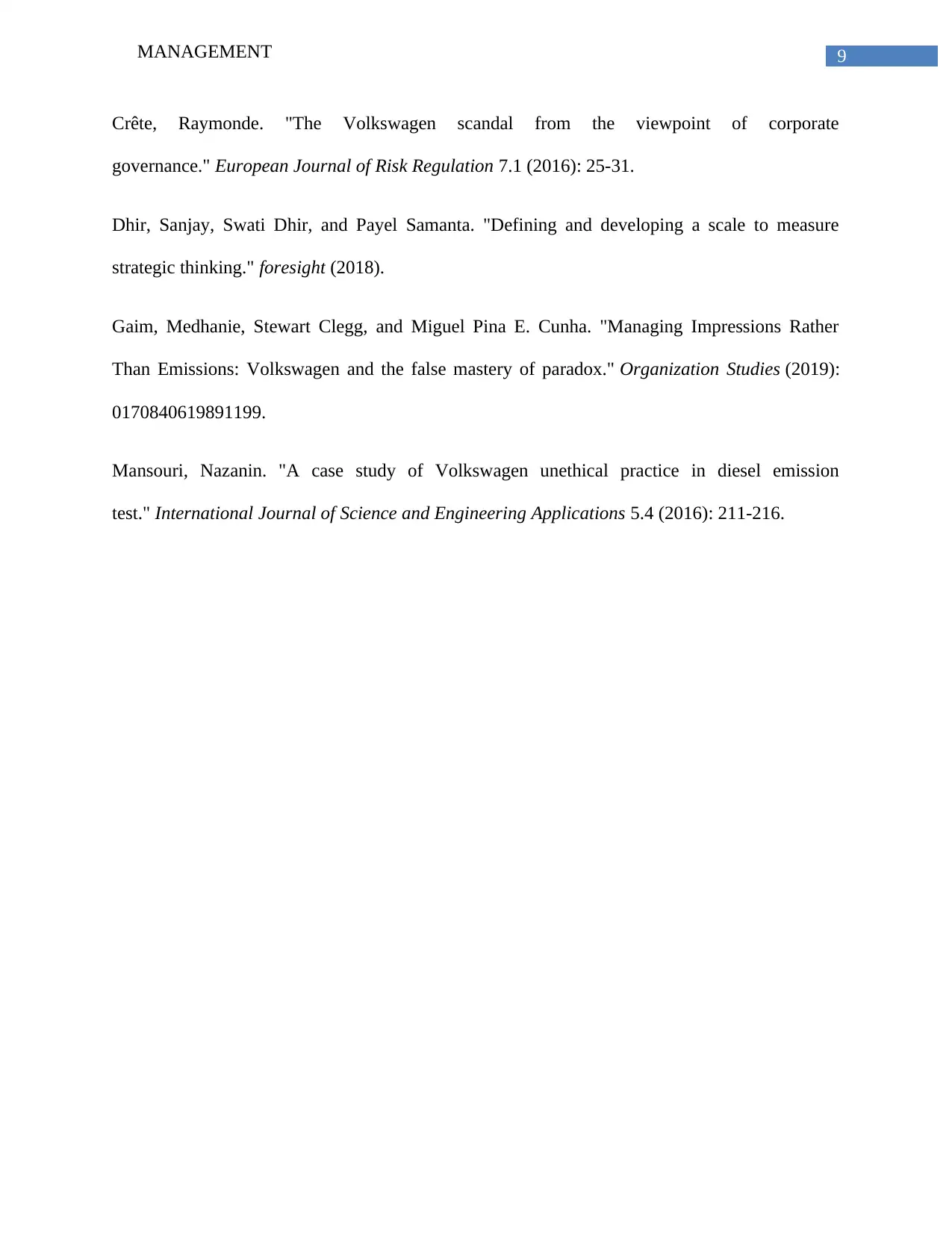
9MANAGEMENT
Crête, Raymonde. "The Volkswagen scandal from the viewpoint of corporate
governance." European Journal of Risk Regulation 7.1 (2016): 25-31.
Dhir, Sanjay, Swati Dhir, and Payel Samanta. "Defining and developing a scale to measure
strategic thinking." foresight (2018).
Gaim, Medhanie, Stewart Clegg, and Miguel Pina E. Cunha. "Managing Impressions Rather
Than Emissions: Volkswagen and the false mastery of paradox." Organization Studies (2019):
0170840619891199.
Mansouri, Nazanin. "A case study of Volkswagen unethical practice in diesel emission
test." International Journal of Science and Engineering Applications 5.4 (2016): 211-216.
Crête, Raymonde. "The Volkswagen scandal from the viewpoint of corporate
governance." European Journal of Risk Regulation 7.1 (2016): 25-31.
Dhir, Sanjay, Swati Dhir, and Payel Samanta. "Defining and developing a scale to measure
strategic thinking." foresight (2018).
Gaim, Medhanie, Stewart Clegg, and Miguel Pina E. Cunha. "Managing Impressions Rather
Than Emissions: Volkswagen and the false mastery of paradox." Organization Studies (2019):
0170840619891199.
Mansouri, Nazanin. "A case study of Volkswagen unethical practice in diesel emission
test." International Journal of Science and Engineering Applications 5.4 (2016): 211-216.
1 out of 10
Related Documents
Your All-in-One AI-Powered Toolkit for Academic Success.
+13062052269
info@desklib.com
Available 24*7 on WhatsApp / Email
![[object Object]](/_next/static/media/star-bottom.7253800d.svg)
Unlock your academic potential
Copyright © 2020–2026 A2Z Services. All Rights Reserved. Developed and managed by ZUCOL.





